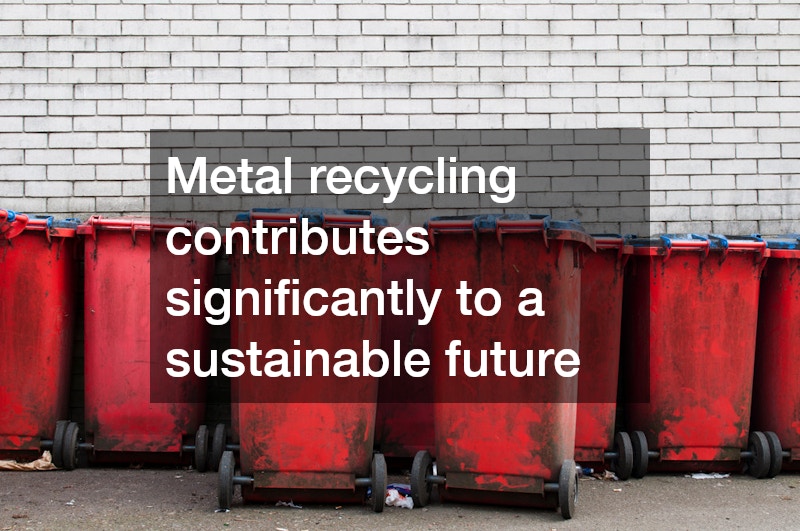In today’s environmentally conscious world, metal recycling stands out as a crucial process with broad-reaching impacts. It involves the collection and processing of scrap metals for reuse, minimizing the need to extract and refine raw materials. This article explores the multifaceted benefits of metal recycling, from stimulating economic development to protecting the environment, underlining its importance in fostering a sustainable future.
What Are the Economic Benefits of Metal Recycling?
1.1 Job Creation
The metal recycling industry provides substantial employment opportunities at various stages, including the collection, sorting, and processing of scrap metals. With numerous recycling facilities around the world, this sector plays a pivotal role in expanding job markets, offering positions for both skilled and unskilled workers. The continual growth in demand for recycled materials ensures a steady increase in employment opportunities, reinforcing the economic significance of metal recycling.
Moreover, job creation in metal recycling extends beyond the recycling facilities, impacting industries involved in logistics, manufacturing of recycling machinery, and distribution. These activities generate a ripple effect, leading to increased economic activity and contributing to both local and global economies. By providing sustainable and green job opportunities, the industry aligns with environmental goals, fostering economic resilience.
Studies indicate that for every job within the metal recycling sector, there is a potential to create an additional role in the associated supply chain. This multiplier effect significantly enhances local employment, providing steady income to communities. Thus, metal recycling not only alleviates unemployment rates but also ensures economic growth and development.
1.2 Cost Savings in Manufacturing
By integrating recycled metal materials, manufacturers can reduce their production costs significantly. Recycled metals are often less expensive than newly mined ores, resulting in lower prices for raw materials. These savings can be redirected to improve other areas of production, leading to enhanced product quality and competitiveness.
Additionally, manufacturers using recycled metals can benefit from reduced energy consumption, as processing recycled materials is generally less energy-intensive than refining new ones. This not only lowers production costs but also reduces environmental impact, aligning industry practices with sustainability goals. The cost-efficiency associated with recycled materials often translates to savings for consumers, enhancing market competitiveness.
Moreover, using recycled metals stabilizes the market by reducing the susceptibility to raw material price fluctuations. This price stability benefits manufacturers by allowing for more predictable budget planning and production scheduling. Ultimately, recycled metal usage supports a more balanced and resilient industrial economy.
1.3 Contribution to Local Economies
The metal recycling industry significantly contributes to local economies by fostering business developments and attracting investments. New recycling facilities stimulate local markets, as they require infrastructure, transportation solutions, and various services. This activity invigorates commercial environments, facilitating economic progress within communities.
The economic contribution extends beyond direct business growth, impacting sectors such as transportation, real estate, and services. As recycling companies establish operations, towns and cities benefit from enhanced infrastructure, increased property values, and greater civic engagement from the business community. This creates a robust local economy with dynamic growth potential.
Local governments increasingly recognize the value of metal recycling as part of their economic development strategies, offering incentives for businesses in this sector. These incentives lead to enhanced economic activity, creating a cycle of growth that benefits businesses and residents alike. As a hub of sustainable economic expansion, metal recycling fosters prosperous, sustainable communities.
How Does Metal Recycling Benefit the Environment?
2.1 Reduction in Pollution
Metal recycling plays a critical role in reducing the environmental impact associated with conventional metal extraction and processing. Traditional metallurgy activities are known to release significant amounts of pollutants into the air and water, contributing to environmental degradation. By replacing primary metal production, recycling reduces emissions of greenhouse gases, pollutants, and water contaminants.
This reduction in pollution not only benefits the environment but also enhances public health by improving air and water quality. Communities near recycling facilities tend to experience fewer pollution-related health issues, leading to improved well-being and reduced healthcare costs. The environmental benefits of metal recycling exemplify its role in supporting ecological balance and combating global challenges like climate change.
2.2 Energy Conservation
Energy conservation is one of the standout benefits of metal recycling, as it consumes considerably less energy compared to primary metal production. The extraction and refining of new metals require significant energy input, contributing to larger carbon footprints. By utilizing recycled metals, industries can achieve substantial energy savings, supporting global energy efficiency goals.
These energy savings have profound economic and environmental implications, such as reducing reliance on fossil fuels and decreasing power plant emissions. Energy-efficient practices reduce operational costs for industries, enhancing their sustainability. These savings help mitigate resource depletion and lower greenhouse gas emissions, contributing to a greener economy.
2.3 Conservation of Natural Resources
Metal recycling is essential for conserving natural resources, as the demand for newly mined metals can negatively affect ecosystems. Mining activities significantly disturb land, affect biodiversity, and contribute to habitat destruction. By recycling metals, the need for such raw material extraction decreases, preserving natural habitats and reducing environmental degradation.
This conservation effort is crucial in maintaining ecological balance, safeguarding ecosystems and protecting species from mining-related threats. As human population and consumption increase, resource conservation becomes increasingly vital for sustaining quality of life and biodiversity. Metal recycling supports these efforts by reducing the pressure on natural resources and helping maintain ecological sustainability.
Metal recycling offers a multitude of benefits, extending beyond economic advancement to profound environmental impacts. The industry’s role in creating jobs, reducing manufacturing costs, and empowering local economies highlights its significance in economic growth. Concurrently, its environmental benefits, including pollution reduction, energy conservation, and natural resource preservation, emphasize its importance in sustainability.
By fostering these positive economic and environmental outcomes, metal recycling contributes significantly to a sustainable future. It prompts action at individual, community, and industry levels to embrace recycling practices. As metal recycling continues to develop, it represents a powerful tool in achieving both ecological balance and economic prosperity.
.



